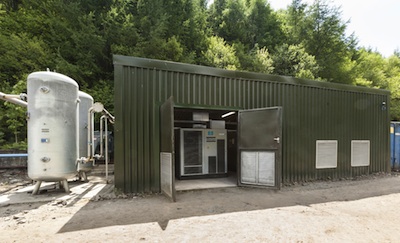
Uncategorised (4996)

Cambridge-based Ubisense, a company specialising in location-based smart technology, has secured a £5-million revolving credit facility from HSBC to support its expansion plans.
The AIM-listed company supplies products that enable manufacturers, utilities and telecoms providers to track assets, such as tools and vehicles, and people, in factories and other indoor environments. The technology is claimed to be more accurate than current satellite-based systems.
The new credit facility provides Ubisense with financial flexibility and backing to gain new contracts and to fund the operations. It will also support the company's growth across a range of global markets, including telecoms industries and various manufacturing sectors.
Earlier this year, a large US steel manufacturer selected the Ubisense Smart Factory System for process tracking for a process involving the transfer of molten metal from blast furnaces to other areas around the manufacturing plant in an efficient and safe manner.
Because of the distances involved, rail ‘torpedo’ cars are used for this purpose and have to be constantly monitored for both process safety and efficiency. For example, deviations in temperature can result in significant cost increases if the contents of the ’torpedoes’ have to be reheated.
The steel maker is integrating the Ubisense system with its thermal imaging cameras to provide visibility of the industrial process at critical process steps such as weighing stations and discharge. Temperature, quality or weight distribution problems can be identified in real-time; allowing operators to be alerted and take timely corrective action.
Knowing the precise location and orientation of the rail cars can also be used to determine the wear and tear profile of not only the rail equipment but also the very expensive high temperature lining of the rail car itself.
Elsewhere a large automotive manufacturer has deployed the Smart Factory System across a manufacturing facility in France, as part of a joint solution from Atlas Copco. Here it has been installed on workstations to control tools across their assembly line.
The installation is said to ensure that tightening operations are performed accurately and that the appropriate tool setting adjustments are made, ensuring overall that the tightening operations have been performed correctly.
The process was previously done manually by operators via a barcode scan which added around six seconds per tool operation per vehicle.

Dangote Industries Ltd has signed a loan agreement with a consortium of local and international banks totalling $3.3 billion to construct the biggest petroleum oil refinery and petrochemical plants in Nigeria.

Scotland's food and drink sector is on a steady growth path, according to Bank of Scotland research which forecasts a ramp-up in investment and job-creation to target new export markets over the next five years.

Natural mineral water company Purely Scottish has recently signed a £340,000 finance deal with Bank of Scotland to enable it to switch from renting its production premises at Oldhamstocks, near Dunbar, to buying it outright.
The purchase secures long-term and direct access to natural mineral water sourced from the company's own organic certified land, as well as bottling and labelling it at source.
As a result of the purchase, Purely Scottish is now predicting a sales growth of around £1.8 million in the next 12 months by increasing its production and expanding its supply across Scotland and into the rest of the UK for the first time.
The deal with Bank of Scotland is also supporting 40 jobs as well as helping to create a further eight new positions at the Oldhamstocks site.
Purely Scottish has an annual turnover of around £1.4 million and supplies around 12 million litres of natural mineral water to businesses, schools, retail outlets and major supermarkets, including Tesco, Asda, Morrisons and Aldi in Scotland.
We’re now able to secure the future of our Scottish natural mineral water, which is sourced directly from our privately-owned site near Dunbar, said John Scrymgeour-Wedderburn, managing director of Purely Scottish.
“Financial support from Bank of Scotland has enabled us to purchase our premises and plan significant growth for the business in the year ahead, which will include expanding sales beyond Scotland for the first time."

The UK's Green Investment Bank plc (GIB) has appointed of a new managing director for waste and bio-energy.

The Centre for Process Innovation (CPI) is close to completing the first stage in its process to award the design and build contract for the new National Biologics Manufacturing Centre (NBMC).
The facility will be designed to assist companies in proving and scaling-up processes to manufacture new biologic medicines such as antibodies and vaccines.
The project is part of the government's Strategy for UK Life Sciences’ launched in 2011 to strengthen the life-science sector. It will support the commercialisation of research by promoting collaboration between academia, the National Health Service and industry.
After evaluating the PQQs, CPI will invite tenders from qualified bidders and has listed 24 Dec as the earliest possible contract-award date.
 Unity Mine has improved efficiency and reduced energy consumption at its Cwmgrwach operation in the Neath Valley, Wales by replacing the existing diesel driven compressors with new electrically-powered units from Atlas Copco.
Unity Mine has improved efficiency and reduced energy consumption at its Cwmgrwach operation in the Neath Valley, Wales by replacing the existing diesel driven compressors with new electrically-powered units from Atlas Copco.
The mine re-opened in 2008 as it became commercially viable again. This was due to increasing volumes of imported coal coming in to the UK and global price increases driven by demand particularly in China and India.
Unity Mine is now ramping up production to deliver up to one million tonnes of coal per year to supply fuel for major industrial companies, including the nearby coal-fired Aberthaw Power Station. Current geological estimates are that there are reserves of 90 million tonnes of coal that will be extracted from the mine complex over the next 25 years.
The Cwmgrwach operation is a drift mine, meaning that miners can walk in rather than being transported, via a vertical mine shaft winding system, as used in other deep mining sites. At the mine, the coal seams are accessed by driving sloping tunnels through the ground.
After the mine’s re-opening, the company’s management focus was on the reliability and efficiency of production equipment, according to Duncan Kilbride, director of projects & procurement at Unity Mine
“The initial plan of the mine’s workings were based on the pillar and stall extraction methods that employ a continuous miner unit and secure the work with roof bolting, as opposed to arched roadways," said Kilbride.
"These all require air-driven equipment fed by a reliable continuous supply of compressed air. We also operate pumps on a permanent basis to remove water,” he added.
Air for these operations was supplied originally from a number of small, rented diesel-driven compressors but there was growing concern with their mechanical reliability and the risks of any break in the regular supply of diesel fuel. This issue, coupled with increasing rental and fuel costs, ensured the case for replacement with more energy and cost-efficient compressors.
“We invited tenders for the system and Atlas Copco came up trumps as a one-stop shop solution for the compressors, filtration units, controller and compressor house installation,” said Kilbride.
Two oil-lubricated, air-cooled, full-feature GA110 variable speed drive screw compressors were installed together with a companion fixed-speed version machine.
These, say Atlas Copco, could provide energy savings of around £13,000 per year as well as substantial savings in equipment rental costs.
The Atlas Copco compressor units provide base load and back up peak 7bar air to the drilling and roof bolting equipment, and the water pumps.
 EGC Critical Components has recently selected Victrex PEEK (polyetheretherketone) engineering polymer for a self-actuated abeyance seal system in one of the most performance-critical industries, nuclear energy generation.
EGC Critical Components has recently selected Victrex PEEK (polyetheretherketone) engineering polymer for a self-actuated abeyance seal system in one of the most performance-critical industries, nuclear energy generation.
According to Victrex, the material selection and design of this application was created for a first-to-market OEM supplier requiring an abeyance seal to manage potential reactor coolant leaks during an emergency shutdown.
The newly designed seal is self-actuated without the need of springs or pistons. Tests have shown this abeyance sealing system alone has added an additional 96 hours of continuous use under the most rigorous operating environments meeting the higher demands of the Nuclear Regulatory Commission (NRC).
A nuclear reactor’s primary cooling pump (PCP) relies on the multi-stage abeyance sealing system, including actuation and back-up rings, to limit the leakage of the reactor coolant fluid along the pump shaft, a Victrex press release explains.
These components are critical to the pressure boundary system. Reactor cooling systems are tested heavily and are expected to withstand continuous service of more than 15 years.
Testing of the patented sealing system included two hours in 204°C water with a sealing pressure of 51.7 bar. Once completed, the temperature and pressure were increased to 292°C and 86.2 bar, respectively.
The test results, said Victrex concluded that even under extreme conditions and loss of seal cooling, the PEEK ring within the abeyance seal system was intact with no appreciable loss of reactor coolant.

BASF is to invest around Euro1.8 billion for its its Crop Protection division to build and upgrade production and formulation capacities between 2013 and 2017.
The plan, to meet expand the Crop Protection business, represents a doubling of annual investments in production plants for the division from around Euro150 million to over Euro300 million.
Amongst others, this figure covers plans to expand production capacities for the fungicides F500 and Xemium in Germany as well as for herbicides dicamba and Kixor, which are produced in the US. BASF is also planning to build new or expand existing formulation plants at several sites around the world, particularly in Asia.
“We have made great progress over the past years. We have demonstrated sustainable growth in our sales and earnings and are confident we will continue with this development,” said Markus Heldt, president of BASF’s Crop Protection division.
“This success stems from our commitment to providing innovations that address the importance of having sufficient and high quality food for a growing population. We continue to expand our portfolio, for and beyond crop protection products, to deliver integrated technologies that can help growers run their business more efficiently.”
BASF estimated the total peak sales potential for its crop protection pipeline – represented by products launched between 2010 and 2020 – at Euro1.7 billion – Euro500 million more compared to the previous year.
To reach its targets, BASF will maintain its commitment to investing around 9% of the Crop Protection division’s sales into R&D activities, targeted towards developing new active ingredients, formulations and solutions beyond crop protection.

Rotork has supplied an order from the Shanghai Pudong Hanwei Valve Co for two WGS Series subsea gearboxes fitted to a double block and bleed valve for a natural gas pipeline in the Bohai Sea. The 8 inch Class 600 valve is being installed a depth of 30 metres on a pipeline serving the Suizhong SZ36-1 oilfield and operated by the China National Offshore Oil Corp. (CNOOC).
Designed for heavy duty subsea applications, the Rotork WGS quarter-turn gearbox features a worm shaft supported on taper roller bearings, a high strength alloy steel worm screw and a membrane or piston type pressure compensator to enable operation at any depth.
Gearboxes can be equipped with a high visibility position indicator, vertical or horizontal ROV inputs and a handwheel for diver operation. Self locking and available with many gearing ratios, WGS gearboxes are permanently lubricated and designed for output torques of up to 500kNm.
More...

Rotork is supplying three coal seam gas-to-LNG projects in Queensland, Australia with over 5000 valve actuators, embracing electric, electro-hydraulic, pneumatic and gas-over-oil technologies
The end clients – Queensland Curtis LNG, Santos GLNG and Australia Pacific LNG – are developing coal seam gas in Queensland’s Surat and Bowen Basins.
Hundreds of kilometres of pipelines will link the natural gas production wells on the Queensland mainland with an LNG production plant under construction on Curtis Island. This will initially produce more than 27,000ktpa million tonnes of LNG for export.
For the upstream mainland wellheads, HART-enabled Rotork CVA modulating electric actuators have been ordered for process valve control at an eventual total of 2000 widely distributed sites.
In addition to natural gas, CVA actuators will also control the flow on the extraction process for coal seam water. This resource will be treated for use by agricultural and industrial customers as well as supplementing domestic water supplies.
CVA actuators deliver continuous, repeatable modulating control with a programmable fail to position option, said Rotork. Resolution, repeatability and hysteresis performance is quoted at less than 0.1% of full scale, offering suitability for demanding control valve applications.
CVA electric actuation can remove the cost of using instrument air supplies at these remote sites, where the pressure of the gas itself is too low to provide a viable source for actuator operation. They are also preferred because electric actuation eliminates the release of any environmentally harmful gas into the atmosphere during valve operations, added Rotork.
Nearly 1000 Rotork Skilmatic SI and EH range electro-hydraulic actuators have been ordered for control valves, shutdown valves, wellhead skids and metering skids. These self-contained actuators are said to combine electrical operation with the modulating precision of hydraulic actuation and the reliability of mechanical failsafe motion.
Designed to SIL3 standards for use in safety critical applications, these actuators are also programmable for partial stroke testing, enabling valves to be tested without interrupting routine processes.
The orders for Rotork electric actuators are completed with IQ actuators for various isolating valve automation duties. All the Rotork electric actuator ranges feature advanced and user-friendly non-intrusive programming and commissioning technologies, combined with integral data logging, diagnostics and asset management capabilities.
The balance of Rotork orders on this giant project involves fluid power actuators for the pipeline and the LNG plants on Curtis Island. The majority of these are CP and GP range pneumatic actuators operating butterfly valves on LNG production lines. The actuators are customised with control packages to meet specific operating duties, including SIL2 and SIL3 applications.
The remainder are GO range gas-over-oil actuators, most of which are for the large mainline pipeline shutdown valves. GO actuators are designed to use the pressure of the pipeline gas as the motive power source. Integral control functions facilitate a wide range of duties, usually safety related and including line break, low pressure close, high differential inhibit and ESD.
The orders were received at Rotork offices in Australia, China, Singapore, Italy and the US, with the company's global organisation co-ordinating manufacture and supply from various production centres around the world. In Australia, Rotork has moved to larger premises in order to fully support the Queensland projects.

Burmeister & Wain Energy A/S (BWE) is to supply a grate fired biomass boiler for the new straw-fired power plant of Brigg Renewable Energy in the UK. The plant is scheduled for start-up early in 2016.
The contract is being delivered by BWE in cooperation with Burmeister & Wain Scandinavian Contractor (BWSC) of Denmark – the main contractor for design and turnkey supply of the plant.
BWE and BWSC have previously worked together on the Sleaford biomass plant (pictured) in the UK. The plant is now in the commissioning phase.
The biomass power plant in Brigg is of the same type and is able to burn straw and up 50% wood chips, with a generation capacity of 40MWe.
BWE claims to be a world leader of the straw firing technology for biomass power plants. The company has common roots with BWSC in the old B&W shipyard, which was founded in Copenhagen 175 years ago.
Asia is changing the market place for UK machine builders
Administrator
Article by Amaechi Oduah, marketing manager, Mitsubishi Electric UK:
Wage and consumption levels are rising in the developing economies of Asia, including China. This is opening up an enormous market to UK machine builders and automation engineers who can help them keep production costs down.
At a recent UK Machine Builder conference, hosted by Mitsubishi Electric, strategies for entering Asia and China and building sustainable business were explored.
The great rush into Asia has been underway for some years but until recently the call for manufacturing automation and production machinery had been relatively modest but now, with local labour rates increasing and domestic consumption growing, things are changing fast. In China there is a further twist in that the senior figures of national government are giving way to new leaders who are charged with growing and developing the internal economy of the country – and where China leads, its neighbours are likely to follow.
Throughout Asia much of the recent economic development has been around coastal ports, which provide easy access to export markets. In China development has concentrated on the eastern seaboard, leaving the vast interior to follow in later years.
When people leave agriculture to work in new manufacturing industries, they also move into urban environments where they were unable to grow their own food. This results in them buying food and the rise of retail activities, which quickly develops into the consumption of other goods and services too. Thus demand for manufactured goods and consumables develops alongside the export side of the economy.
This has been apparent in the Asian economies, where naturally wage levels have also increased. It was also inevitable that as industry developed it would be impossible for these countries to produce enough engineers, other professionals and skilled workers.
Economists call this the Lewis Turning Point, where people are no longer willing to work for very low wages because they have opportunities to change to higher paid jobs. In this way, Asia’s eventual need for automated production was predictable and put simply, its time has come.
It is also worth noting at this point that the vast interior regions of China are now developing too. They are some years behind the coastal region but their development will be quicker and more assured, so over time they will catch up.
Slowdown
There has been some worry that Asian growth has slowed in recent years. But to put this into perspective, the main engine, China, has slowed to 8 per cent! In the well developed coastal centres growth is down to 5% and 65% of its economy is now service, an indicator of a maturing economy – and an increasing need for automation!
In a developing country there is inevitably some resistance to importing goods and services. Furthermore the amount of help available to companies for translations, currency exchange, tariffs, visas etc will also be low and there is probably a culture of wanting to ‘buy local’. So in order to win business in Asia and China, overseas companies must have a strong USP or specialism.
Robert Doak, a conference speaker from UK Trade & Investment (UKTI), says that British companies may have their own technical USP but that collectively they are also very good at combining products and service/support:
“Some countries can supply excellent goods; others sell intellectual expertise. But few can achieve the goods and service mix of the UK,” he says. “This is a tremendous strength for machine builders, whose goods will probably need commissioning, regular servicing and frequent redevelopment to adapt to changing end-user demands.”
Doak is also keen to stress that exporting halfway around the world is not the sole preserve of big companies. “There are many opportunities for SMEs, and once established in China a steady stream of work is likely to develop. Getting set-up initially can seem dauntingly complicated, but good initial research and exploratory visits are the first steps. Then there are layers of help available from UKTI, trade associations, business councils, export agencies, all of which are invaluable.”
Another point raised by Doak was that many UK companies think only of China and forget its expansive neighbours, which also need the goods and services of international machine builders. The 10 or 12 nations south of China form a significant sized market, with a combined GDP (gross domestic product) of about US$2trillion (about one-third the size of China or four times the size of the UK). Also in the region are Japan (GDP US$5.5trillion) Korea (US$1trillion) and Hong Kong (US$0.25trillion), all of which are potential markets. Collectively Asia has a GDP comparable to the USA or the EU (US$15-17trillion).
Speaker Stewart Ferguson from the China-Britain Business Council focussed on China’s vast economy. He pointed out that it is not a unitary market, but that the different regions are semi-autonomous, and often culturally very different.
“The language of business throughout China is Mandarin,” he says. “But the local accents and dialects can be so pronounced that they are effectively different languages – even the Chinese sometimes have difficulty understanding people from other regions. There are also major differences in culture, attitudes and manners that you have to allow for if you travel across the country.”
China has a bewildering mix of private companies and state-owned enterprises. Most Chinese companies will only pay in the local currency and will make no effort to help suppliers import their goods. But it is worth noting that China also has many resident non-Chinese companies, so UK machine builders may find it easier to deal with or through these rather than setting up their own distribution arrangements.
UK companies also need to think about how they are going to repatriate their money out from Asia and to make sure they are able to cope with currency fluctuations. There is also the issue of local regulations and protecting intellectual property rights.
Another speaker was Grant Collier from the PPMA Group of automation-focused trade associations. His organisation is very pro-active in helping companies set up in China and has formalised procedures into its three-tiered Dragon Service.
“Our Silver Dragon provides support services, such as market overview research, translations, media contacts,” he says. “With Gold we make introductions, arrange business tours and build contact networks.
“Platinum is what really set us apart. We run an office in Shanghai and will recruit and employ people for clients. They have tenancy in our office and we manage their activities on your behalf. Thus we remove just about all the risks from that initial setting up period.”
Mitsubishi Electric in Asia

KBR Inc. is standardising on simulation software from Invensys, under a multi-year, multi-million dollar contract with the automation vendor.
The licensing agreement will see Invensys provide its SimSci PRO/II steady-state simulation software to help KBR accurately model its process technology. The engineering company uses this in designs for customers and in the technology it licenses to the hydrocarbon processing industry.
Invensys is to provide on-site guidance to help KBR transition from the previous software, according to said Tobias Scheele vice president, design, simulation and optimization for Invensys.
“KBR needed new functionality to support them while they transitioned from a previous simulation tool,” said Scheele. “Our Invensys developers worked hand-in-hand with the KBR team so that they can more accurately model and quickly deliver their processing technology to the market.”
Widely used in the refining industry, the PRO/II software supports process design, revamp and operational analysis activities.
“This mutually collaborative relationship and the valuable assistance they have provided during the transition will help us continue to safely deliver key projects for the benefit of our global customers and other stakeholders,” said John Derbyshire, president, KBR Technology
